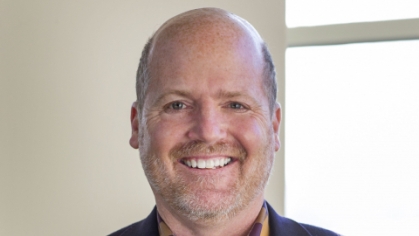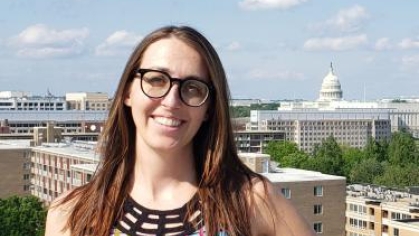Alumni Spotlight: Emmanuel Yamoah ENG‘98
"At Rutgers I was able to design what I felt my future could be.” – Emmanuel Yamoah
As R&D leader at Duracell, Emmanuel Yamoah heads up R&D efforts for Europe, the Middle East, Africa, and Asia (EIMEA). He leads a team that is dedicated to driving the company’s product innovation strategy for disposable and renewable power. He is also a member of the School of Engineering's Industry Advisory Board.
After graduating from Rutgers with a degree in chemical engineering, he began his career at Procter & Gamble as an engineer in global personal health care, later advancing to roles as senior engineer in North America oral care product development and global feminine care product development. At the time of Duracell’s spin-off from P&G, and prior to assuming his current role, he was serving as R&D manager of Global Duracell product development.
Where did you grow up?
I was born in Ghana, but moved to New Jersey with my family when I was three. I grew up in Newark and then Roselle.

Why engineering?
I had the opportunity to go to St. Benedict’s Preparatory School, an amazing high school in Newark. I was exposed to chemical engineering while there and was encouraged by a few instructors who helped me realize my potential in math and sciences.
How did your high school experience prepare you for Rutgers?
I carried three things in to Rutgers – leading, building skills, and competing with myself every day to be the best I could be. I’d been the school leader my senior year at St. Benedict’s, which gave me the opportunity to build leadership skills at a young age. I’d been exposed to how I could apply my skills and abilities in math and science. Lastly, I was also an athlete. When I got to Rutgers, I walked on to the track team, where I primarily competed in the long jump. I could jump high and run fast—and I committed myself to being competitive and strong at what I did, pushing myself every day to be better than I was the day before.
How would you describe your current leadership style?
I would like to say its collaborative and inspiring. I encourage my team at Duracell to identify what could be possible and then point a way forward from there. We work as partners, knowing that one plus one is equal to three. There’s an element of selflessness, as well, as I am committed to working together with my team to drive the company’s mission and vision while also helping to drive their personal aspirations.
What benefits did Rutgers offer you?
A major benefit was the support systems and the many different communities you can be part of—whether clubs, teams, organizations, and academic departments. I always felt a sense of belonging and a sense of camaraderie among my fellow students.
Besides the track team, I engaged with Minority Engineering Educational Task, or MEET, and the Rutgers chapter of the National Society of Black Engineers. That organization introduced me to other African Americans and individuals of African descent who were doing what I was doing.
What do you value most about your Rutgers education?
I was able to design what I felt like my future could be. I had great advisors and professors in chemical engineering and in Rutgers Engineering as a whole, who had been there, done that, and seen students like me. This meant they had a tool kit ready that gave me ways to think about options I could leverage to catapult forward. Dean Donald Brown (retired), in particular, was one of the most influential people in my life while at Rutgers.
There was a good level of flexibility and customizing, so I could devise a program that suited me. One example was my ability to engage in independent research in biomedical engineering where I gained invaluable skills and experiences in research. I was designing my future with mentoring, which helped me define and determine what I wanted to do after graduating.
Have you ever served as a mentor?
I have and currently do serve as a mentor. In fact, I’ve partnered with a fellow Rutgers alum, Dr. John Healey, who’s also a St. Benedict’s graduate to create a pipeline of students interested in engineering and enable them with scholarship and other support.
What does it mean to you to be part of two of the School of Engineering’s external advisory boards?
I’m honored to have recently joined the School of Engineering Industry Advisory Board and the Department of Chemical and Biochemical Engineering’s external advisory board. One of the things I hope to do is establish a strong pipeline for students—particularly those from traditionally underrepresented communities—who want to become engineers.
The chemical engineering department has a special place in my heart and I am eager to draw a bigger connection between the department and what’s happening in the broader context of the school itself.
What else do you hope to accomplish?
I’m in the power and battery industry at Duracell and am passionate about power and sustainability issues. I hope to be able to drive more visibility and awareness of what is happening in the industry to Rutgers by sharing insights gained from Duracell, which has been confronting these challenges for years.
I also want to expose and help advance people of color, women, and other individuals who are underrepresented in engineering and STEM disciplines. My objective is to help to enable students with support systems that existed when I was at Rutgers, as well as with new ones. I’d like to help identify ways Rutgers can make connections with young students as early as grammar school and right up through middle school, high school and even into their professional careers.
What did you do for fun at Rutgers?
I lived on Busch campus and served as preceptor/RA after my first year. While school and track and field took up a lot of my time, the National Society of Black Engineers was its own version of fun and a great community to be engaged in.
There were also parties throughout all the campuses—I enjoyed my fair share of them! I had a good community of friends to hang out with on weekends and, since New York City was just a train ride away, I spent some time there as well.
What do you do these days for fun?
I travel a lot for my job and have a 12- and six-year-old, so I try to balance that—and keep myself fully engaged for my kids. My wife is a pianist and we both love music and enjoy going to a lot of concerts. Living in Connecticut, we’re close enough to New York City to engage with a mix of music and arts there.
I like running and basketball—though don’t have as much time as I like for athletics. My daughter is a softball pitcher and I enjoy being her catcher. My son plays soccer and baseball and I coach his track team—he’s six and started running at five. I have no expectations—just want him to have fun and learn how to be part of a team.
I’ve always enjoyed words and language and I also write and used to perform poetry. I’m starting to get back into that creative side of my life more now.
Where would you go if you could go on a vacation tomorrow?
My wife and I want to expose our children to diversity and culture and appreciate who they are and what the world has to offer. We’ve recently had the chance to take them to Malaysia. Next, I’d love to take them to Ghana, and expose them to that part of their ancestry and show them just how vast and diverse the world is. We want our kids to be citizens of the world.


